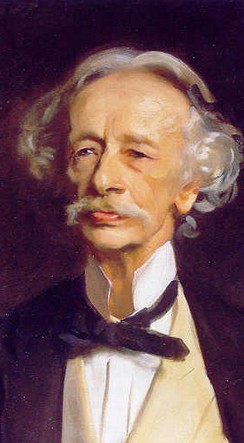 There are a few lines from a poem by Coventry Patmore that stick in my mind for their remarkable, evocative power. I first read them in a 1939 anthology by Walter de la Mare called Behold This Dreamer, a rambling collection of prose and poetry about “Reverie, Night, Sleep, Dream, Love-Dreams, Nightmare, Death, the Unconscious, the Imagination, Divination, the Artist, and Kindred Subjects.”
There are a few lines from a poem by Coventry Patmore that stick in my mind for their remarkable, evocative power. I first read them in a 1939 anthology by Walter de la Mare called Behold This Dreamer, a rambling collection of prose and poetry about “Reverie, Night, Sleep, Dream, Love-Dreams, Nightmare, Death, the Unconscious, the Imagination, Divination, the Artist, and Kindred Subjects.”
Smitten by the lines, I looked up Coventry Patmore and found that the lines were from the very long poem “The Angel in the House,” much of which I found uncongenially treacly. So I retreated from Patmore and stuck with the judicious selection of de la Mare. Less is more. In fact, one of the things I like about these lines of verse is that they capture the quintessence of romanticism, and I think I can see in them something that Wordsworth, though a finer poet, can’t manage to get across in a hundred pages.
Here are those lovely lines:
And then, as if I sweetly dream’d,
I half-remember’d how it seem’d
When I, too, was a little child
About the wild wood roving wild.
Pure breezes from the far-off height
Melted the blindness from my sight,
Until, with rapture, grief, and awe,
I saw again as then I saw.
As then I saw, I saw again
The harvest-waggon in the lane,
With high-hung tokens of its pride
Left in the elms on either side;
The daisies coming out at dawn
In constellations on the lawn;
The glory of the daffodil;
The three black windmills on the hill,
Whose magic arms, flung wildly by,
Sent magic shadows o’er the rye.
Within the leafy coppice, lo,
More wealth than miser’s dreams could show,
The blackbird’s warm and woolly brood,
Five golden beaks agape for food;
…
And, dearer far than anything,
Came back the songs you used to sing.
(Ah, might you sing such songs again,
And I, your child, but hear as then,
With conscious profit of the gulf
Flown over from my present self!)
And, as to men’s retreating eyes,
Beyond high mountains higher rise,
Still farther back there shone to me
The dazzling dusk of infancy.
Thither I look’d, as, sick of night,
The Alpine shepherd looks to the height,
And does not see the day, ’tis true,
But sees the rosy tops that do.